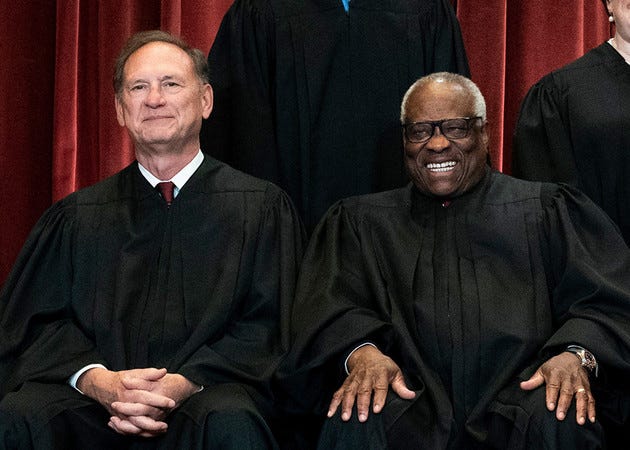The Supreme Court Needs to be Fixed
Here's how.
On the day of his impeachment hearing, Supreme Court Justice Samuel Chase had tears in his eyes. The 63-year-old, who was known as “Old Bacon Face” (because he constantly had a reddish-brown complexion), was usually a gruff and commanding man. But today was not a good day for Chase.
Chase was on trial for “tending to prostitute the high judicial character with which he was invested, to the low purpose of an electioneering partisan.”
In other words, he was accused of misusing his powerful position on the high court. Chase enjoyed a place as an American founder: he signed the Declaration of Independence and was appointed to the Supreme Court by George Washington in 1796. But there wasn’t much for the Supreme Court to do back then, so he made himself busy by working as a judge on the lower courts.
And his inappropriate conduct there is why he ended up sitting trial for impeachment. In one instance, just before the opening of a trial in Philadelphia, Chase showed the defense attorneys his already-written opinion on the case. He had predetermined the outcome.
During another trial in Richmond, a potential juror said that he believed the defendant to be guilty, even before the jury had heard any evidence. Chase let the person sit on the jury anyway. And then in Delaware, he got mad at a grand jury when they decided against Chase’s will that there wasn’t enough evidence to charge a suspect.
But Chase’s biggest problem arose in 1800, when he campaigned for John Adams’s reelection. Adams lost, and the man who won, Thomas Jefferson, was not super happy that Chase had shown such an overtly partisan preference for his opponent. Jefferson wrote a letter to a friend in Congress, detailing some of Chase’s actions and asking, “...ought this seditious & official attack on the principles of our constitution, and on the proceedings of a state, go unpunished? And to whom so pointedly as yourself will the public look for the necessary measures?”
In short: I can’t do anything about this guy because of the Constitution, but you can, so please help.
The representative, John Randolph, said don’t worry, I will “wipe the floor of the obnoxious judge.”
Randolph introduced articles of impeachment in the House, and the House voted 73-32 to impeach Samuel Chase, saying that he refused to dismiss prejudiced jurors and limited witnesses during sensitive cases.
The case was then sent to the Senate for a trial, where it was presided over by none other than Vice President Aaron Burr, who had made his own mess by shooting and killing Alexander Hamilton during a duel months before.
One newspaper headlined an article about the trial, “The World Upside Down,” and wrote in the piece: “Formerly it was the practice in courts of justice to arraign the murderer before the Judge, but now we behold the Judge arraigned before the murderer.”
The morning of the Senate hearing, December 7, 1804, through his tears, Chase asked for a delay in the case so he could better prepare his defense. Burr granted him one, and a month later, in January 1805, Chase asked if he could read his more than 100-page response to the articles of impeachment. It took more than 3.5 hours to read, during which Chase denied all the charges, said that there is “inconclusive” evidence, and that the party in power was construing his words to destroy him because of political differences.
Weeks went by, and 50 witnesses were called between the prosecution and the defense. Eventually, Chase was acquitted in the Senate, and allowed to remain on the Court until his death in 1811.
Chase remains the only Supreme Court justice to be impeached. But one Representative, Alexandra Ocasio-Cortez, has recently filed articles of impeachment against two justices, Samuel Alito and Clarence Thomas. Ocasio-Cortez says, “Justice Thomas and Alito’s repeated failure over decades to disclose that they received millions of dollars in gifts from individuals with business before the court is explicitly against the law, and their refusal to recuse from the specific matters and cases before the court in which their benefactors and spouses are implicated represents nothing less than a constitutional crisis.”
A lot has changed in the past two hundred years, but Supreme Court justices still receive a lifetime appointment, and the only way to remove a justice is through impeachment, as written in the Constitution. But in that 200 years, the Supreme Court has grown in size (it was six justices originally) and scope. It went from hearing an average of six cases per year to between 100-150 a year. And as the country has gotten more polarized, so has the court.
Currently, over half of Americans have an unfavorable view of the Supreme Court according to a recent Pew Research Center survey (conducted in July 2024). In the past four years, the public opinion of the court has dropped 23 percentage points.
There have been a couple of proposals in the past year to reform the court, as multiple justices have been accused of partisan behavior and unethical practices. And Congress is toying with ways to address it.
Several Representatives have introduced the Supreme Court Ethics Act, and President Biden has also made his own proposal.
The proposals would allow the public to submit ethics complaints and would create an outside committee to investigate the complaints. Justices would be required to disclose gifts, would be mandated to refrain from public political activity, and would have to explain why they are recusing themself from a case (or why they are not recusing themself if a concern has been raised).
Yes, an enforceable code of ethics would be possible. The entire federal government must follow a strict code of conduct – why not the Supreme Court?
And this proposed bill isn’t the only way we can ensure that justices are acting in a manner that is above reproach. There could be a congressional committee to investigate and oversee complaints, a council of randomly selected federal judges to hear ethics complaints against the court, or a citizens’ councils to ensure rules are being followed.
Then there’s the idea of term limits. Having unlimited tenure means that a single justice can impact the law for generations. Two years ago, an Associated Press/NORC Center for Public Affairs Research poll found that 67% of Americans support term limits for justices.
President Biden and others have proposed that each president appoint a justice every two years who would spend 18 years on the bench. This could help de-politicize the court, which most Americans agree would be a welcome change.
Right now, presidents can appoint someone when another judge retires or dies. Some presidents get to appoint a lot of people, others none at all (William Henry Harrison, Zachary Taylor, Andrew Johnson, and Jimmy Carter had no vacancies while in office). Some presidencies then have a major impact on the legal and cultural look of our country, while others do not.
Ethics are not a matter the court should take lightly. The justices should want as much transparency as possible so they ensure the public, over whom they have considerable power, feels that they are not being controlled by billionaires, corporate interests, or crooked dealings. The court shouldn’t just avoid impropriety, it should avoid even the appearance of impropriety. And right now, that isn’t the case.
I’d love to hear your suggestions for Supreme Court reforms!








The world has evolved so much since the founders of this country wrote the documents that we still hold as our foundation.
1) People live significantly longer now than they did in the early 19th century, lifetime appointments now mean an extra couple of decades that they wouldn’t have had back then.
2) The electoral college (the original DEI in this country!) has worked against the popular vote in too many elections, and keeps our country in a two party system.
3) The 2nd Amendment was written when the arms we were granted were things like bayonnettes and pistols that couldn’t do the damage that todays weapons can.
4) Women and minorities couldn’t even vote, nor were they given any voice in framing the constitution.
What people need to realize is that our constitution and the amendments and laws can, and SHOULD, evolve as our contry does.
1) SCOTUS term limits should exist now, as well as for members of congress. We enacted it for POTUS, so it’s not a radical idea to enact it for other branches of our government.
2) The electoral college should either be eliminated OR at the very least, distribute votes as they do in Nebraska. It shouldn't be a winner take all system, it makes people think their vote doesn’t matter.
3) The 2nd amendment can still be in place, but it should be amended to reflect that the arms available to people now can mow down multiple people in a matter of seconds. Remember when we repealed prohibition? Again, not radical to say ‘oops, we need to fix this’.
4) Now that ALL citizens have a voice, the revisions mentioned above would reflect the will of the PEOPLE, not just the white men.
Thank you for teaching people using history and facts and making it easier for people to understand how our government works and for letting people know how we have the ability to use our voice - and we SHOULD! There is so much misinformation and distrust out there.
I love this. I spent 11+ years working in court administration at the lower court level and have always felt it ludicrous that the lower court judicial officers have to report any gift with a value more than $49 and adhere to a substantial code of ethics and they are hearing, in some cases, traffic tickets.
I absolutely support term limits and I think the points others have made in this thread (especially the longer lifespan that modern day Americans have) support such a measure.
But I also think that we need to start some of this reform at a lower level. Many of our Supreme Court Justices (past and present) have been Federal Judges who have have worked their way up the court levels until they have sufficient reputation and experience to gain the higher appointments. They often start their careers in seats elected by their communities. I would ask the majority of governerds how they choose their local judges...most people I talk to just pick a name because so little information is provided. Part of this is because the bench is supposed to be apolitical but we see via the Supreme Court that is an impossibility. As a result, I've seen very conservative judges elected and reelected in very liberal communities and vice versa. These judges then work their way up and make huge impacts on their communities when it's likely constituents wouldn't have elected them if they had understood their political bent and the resulting impact. So my other proposal is that for transparency, during judicial elections at ALL levels, candidates should have to declare any party previously registered with OR their stance on a set of issues that would allow the public to make educated decisions on their judicial ballot. The local judges become the state judges who become federal judges and it all funnels up. We should be able to make an informed choice about who we are dropping in that funnel.